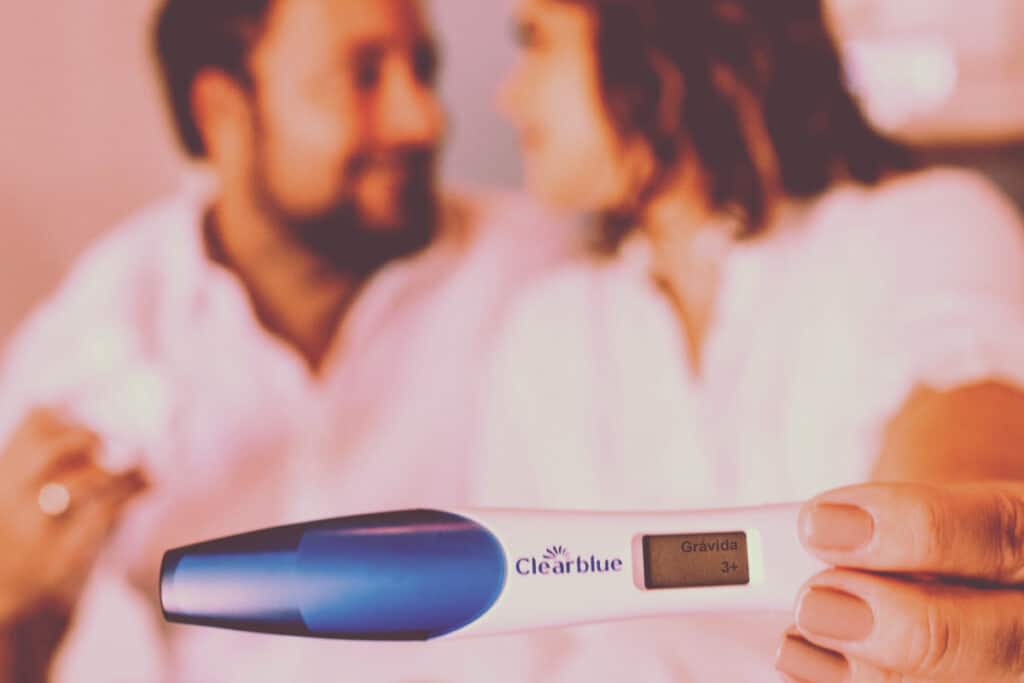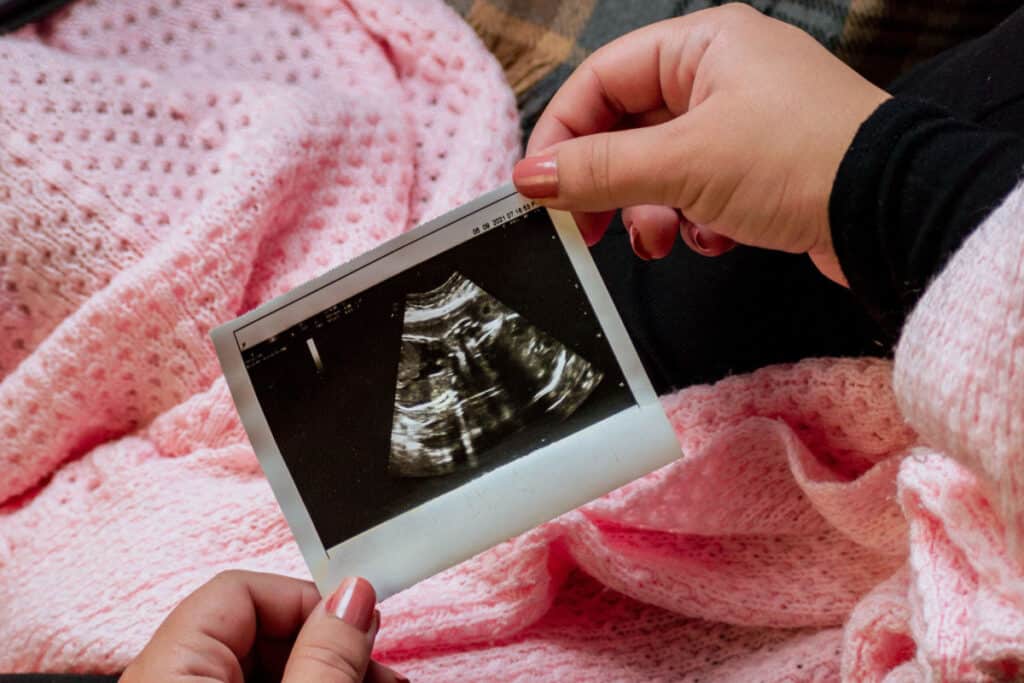In fact, there is no such thing as the first symptoms of conception, because every woman goes through pregnancy differently - some women may complain of all pregnancy-related discomforts for nine months, while others will enjoy excellent health and well-being throughout the entire pregnancy.
The first mistake is to look for signs of pregnancy right on the second day after intercourse, because any signs of conception appear no earlier than in two weeks, but even then it is not at all certain that the observed symptoms have their cause precisely in pregnancy.
Pregnancy - what symptoms can it manifest?

- The primary symptom that women associate with being pregnant is the stoppage of menstrual bleeding. In fact, the absence of menstruation often signifies pregnancy, but it could just as well be a sign of a hormonal disorder. Periods can also disappear for a period of time if a woman has a very stressful lifestyle, gets little sleep, is on a very restrictive diet or is ill.
- Other symptoms of conception include gastrointestinal complaints, mainly morning nausea, vomiting and frequent heartburn. Such symptoms do not occur until around the sixth week of pregnancy, so it is a mistake to look for them in the first days after conception. Gastrointestinal complaints and maintaining a nice figure will help. Weicode drops.
- More likely symptoms of pregnancy occurring in the first few weeks include an elevated body temperature. If a woman does not have a cold or any infection, but she may notice an elevated temperature in herself every day, it will probably mean that a freshly implanted embryo is developing in the uterus - the higher temperature is caused by increased levels of progesterone.
- Changes in the mammary glands also become visible. The breasts enlarge, are more sensitive to touch, the color of the nipples changes, and you can see the venous vessels under the skin.
- In addition, stretch marks may appear on the skin of the abdomen, buttocks and thighs, even though the body weight has not yet managed to visibly increase.
- Only those signs that can be determined by a doctor during an examination are considered to be certain signs of conception, which are primarily the outline of the fetus during an ultrasound, the fetus' heart tones and its movements in the uterus.
Also read: NovuVita Femine supplement for women.
First signs of conception and Stages of pregnancy
Featured stages of pregnancy can be divided into weeks, months or trimesters. Each trimester covers three months of pregnancy.

- In the first trimester, counted from the first day of pregnancy until the 13th week, all the major organs of the baby are formed. The first trimester is also the most vulnerable, and it is in the first three months of pregnancy that miscarriages are most common. This is why it is so important for a woman to take special care of her health during this period, especially if she has previously had problems getting pregnant.
- The next stages of pregnancy are related to the development of the baby. In the second trimester the baby is already big enough to feel its movements, and in the third trimester the baby is already fully developed and preparing to come into the world.
- In the third trimester Pregnancy may already have reached delivery and there are good chances that the baby can be kept alive in an incubator under medical care. Earlier stages of pregnancy, unfortunately, do not guarantee this possibility and the baby is unlikely to survive outside the womb.
At the beginning of the first trimester, women usually do not yet know that they are pregnant, and can only observe certain symptoms associated with conception. One hundred percent certainty is obtained only around the fourth-sixth week, when medical examinations are able to confirm unequivocally that fertilization has occurred.
During the second trimester of pregnancy, caloric needs increase significantly. It is then necessary to remember about regular and healthy meals, because on the nutrients provided to the baby depends its proper development. In the middle of pregnancy, the baby's movements are already becoming strongly perceptible, the baby also feels the mood of the mother and, for example, reacts to her nervousness with violent movements. In the second trimester, all unpleasant discomforts known from the first weeks of pregnancy should have already subsided.
The discomfort may return again in the third trimester, when the baby is already large and preparing for delivery. The different stages of pregnancy are also associated with certain tests that a woman should perform, and it is best to ask the pregnancy doctor about the testing calendar.
Fertility capsules for men will also be helpful in getting pregnant NovuVita Vir.
What is ovulation?
It is nothing more than a woman's fertile period, during which she can become pregnant. With a sound knowledge of what ovulation is, it is much simpler to at least plan to expand the family. On the other hand, if we know what ovulation is, how it is recognized and how we can calculate when it occurs, we can also develop a natural method of preventing pregnancy.
How long is the ovulation period?

Ovulation itself takes a very short time, less than 24 hours. This is the amount of time it takes for the egg cell to be released from the Graaf follicle in the ovary and begin its journey through the fallopian tube. If at this point the ovum encounters a sperm on its way, fertilization is most likely to occur, resulting in the development of a pregnancy. If, on the other hand, the ovum does not unite with the sperm at this time, it will die.
The unused egg is expelled from the body during the upcoming menstruation, and the ovaries begin the process of maturing another egg. This cycle repeats on average every month, from the time a girl begins to reach sexual maturity until an adult woman goes through menopause.
Can ovulation be stopped?
As we get older, so-called inovulatory cycles can occur with increasing frequency. This means that despite monthly bleeding, a woman no longer produces egg cells or they do not appear every cycle.
Ovulatory disorders can also occur with diseases of the reproductive organs or pituitary insufficiency, as well as with excessive physical exertion, emotional or metabolic disorders.
Ovulation can also be stopped artificially. It is on this principle that hormonal birth control pills or patches work. They block the process of maturation and release of the egg, so a woman can have intercourse regularly for a whole month and not get pregnant.
The natural ovulatory process begins to function back when contraceptives are discontinued and should have no effect on a woman's subsequent efforts to have a child. What is ovulation can be explained to us in detail by a gynecologist during a follow-up visit.
Also read: pills for female libido.
Ectopic pregnancy - what is it?

Ectopic pregnancy occurs when the fertilized egg cell does not reach the uterine mucosa. In most cases, the embryo that has not reached the uterus is expelled from the body - we then speak of an early miscarriage. However, it so happens that the embryo nests in the fallopian tube or in the abdominal cavity.
Ectopic pregnancy is a major threat to a woman's health and even life. Fortunately, nowadays, thanks to ultrasound examinations, ectopic pregnancy can be detected at a very early stage and can be cured without much damage to health.
Where does an ectopic pregnancy come from?
The exact causes of this disease are difficult to determine. Usually the reason is a previous serious illness (chlamydia, inflammation of the appendages, bacterial infections) or a surgical procedure in the pelvis, or congenital abnormalities in the structure of the reproductive organs (for example, endometriosis).
Ectopic pregnancy can also be triggered by previous use of an IUD, so such a contraceptive method should not be used by young women who have never had children before.
Also read: Prostoxalen for prostate.
What are the symptoms of ectopic pregnancy?
The symptoms of ectopic pregnancy are initially very similar to those of a normal, healthy pregnancy. However, as the embryo becomes larger and larger, serious damage to the body occurs. Depending on where the embryo has lodged, either the cervix or fallopian tube may rupture. This causes profuse bleeding into the abdominal cavity, and if the hemorrhage is not quickly stopped by a doctor, the woman's life is seriously threatened. For these reasons, among others, it is advisable to check with a gynecologist right away, as soon as worrying symptoms appear or a woman has a suspicion that she may be pregnant.
As soon as there are suspicions that the pregnancy is not developing properly, the doctor should order additional tests to determine the level of beta-HCG hormone. Treatment of ectopic pregnancy depends on the moment of detection. When the abnormally implanted embryo is very small and has not damaged any organ, drug treatment is sufficient. In other cases, surgical intervention is necessary. An ectopic pregnancy also does not necessarily mean that a woman no longer has a chance for a normal pregnancy.
Leave a Reply